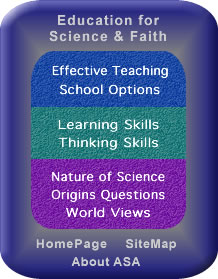
Debates about Science
In the fascinating and controversial area of science studies, some hotly debated questions are:- Should we try to define good science in terms of what we consider to be worthy goals and effective methods, or should we simply define science as "whatever scientists do"?
- What are the connections between worldviews and views of science?
- In what ways are the methods of science — and theories generated by science — influenced by culture?
- If cultural bias exists in a scientific community, how can its knowledge claims be evaluated objectively and accurately?
-
What are the relationships between thinking methods used in science and in other areas of life?
- Is research science (to explore and expand the frontiers of knowledge) more scientific than applied science (to develop practical uses for what we already know)?
- What are the similarities and differences between science and engineering?
- How should we view the scientific contributions made by experimental work (to allow observations) and theoretical work (to interpret observations)?
- In what ways should a scientist's ideas, attitudes, and behavior — such as research choices, theory evaluations, personal and professional relations, and views on ethics (environmental, medical, academic, economic, personal,...) — be affected by a Christian worldview?
- Is atheism more scientific than theism? Is there a "war" between science and religion?
- Would an occasional miracle eliminate the possibility of science?
- Should we define science as an empirically based search for logical explanations, or an empirically based search for natural explanations? Why is this question important when we evaluate theories of origins?
- Do some people think the goal of science is not (or should not be, or cannot be) a search for truth?
These provocative
questions, and others, will be examined from a variety of perspectives. We'll
look at science through the eyes of scientists, and from the
viewpoints of philosophers, historians, sociologists, psychologists,
educators, and others who study the process and products of science.